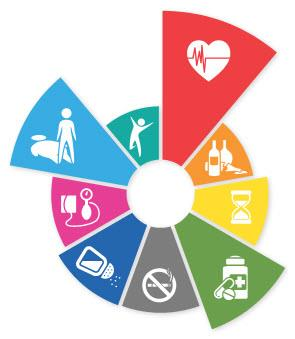Copenhagen, Feb 27 (IANS) Adding noncommunicable diseases (NCDs), such as cardiovascular disease, cancer, chronic respiratory disease and diabetes — responsible for 75 per cent of deaths worldwide — to humanitarian emergency preparedness may help save more lives, according to a joint report by UN agencies.
Humanitarian emergencies increase the risk of NCDs. Strokes and heart attacks are likely to surge up to three times more following a disaster. However, care and treatment for NCDs are often not included as a standard part of humanitarian emergency preparedness and response, which focus on the most immediate needs, said experts from the World Health Organisation (WHO), and UNHCR, the UN Refugee Agency, at a three-day global high-level technical meeting on NCDs in humanitarian settings being held in Denmark.
The number of crises impacting people’s health has been increasing.
In 2023, WHO responded to 65 graded health emergencies worldwide, up from 40 a decade earlier. Similarly, the UNHCR issued 43 emergency declarations to scale up support in 29 countries — the highest number in decades.
The numbers are expected to soar in 2024.
The UN estimates that 300 million people will need humanitarian assistance and protection in 2024 with over half (165.7 million) in need of emergency health assistance.
“People living with NCDs in humanitarian crises are more likely to see their condition worsen due to trauma, stress, or the inability to access medicines or services. The needs are enormous, but the resources are not,” said WHO Director-General Dr Tedros Adhanom Ghebreyesus, in a statement.
“We must find ways to better integrate NCD care in emergency response, to protect more lives from these avoidable tragedies and improve health security,” he added.
NCDs remain a neglected aspect of humanitarian responses, with significant gaps in technical and operational guidance, lack of capacity and resources, said the experts.
To address this, many countries have included policies and services for the prevention and control of NCDs as part of their efforts to strengthen health systems to better prepare for, respond to, and recover from health emergencies.
However, much more needs to be done, said the experts.
“Some specialised services such as dialysis or cancer care require specific planning and adaptations during emergencies, and more insights are needed to better integrate NCDs into emergency preparedness and response.”
–IANS
rvt/vd
Disclaimer
The information contained in this website is for general information purposes only. The information is provided by TodayIndia.news and while we endeavour to keep the information up to date and correct, we make no representations or warranties of any kind, express or implied, about the completeness, accuracy, reliability, suitability or availability with respect to the website or the information, products, services, or related graphics contained on the website for any purpose. Any reliance you place on such information is therefore strictly at your own risk.
In no event will we be liable for any loss or damage including without limitation, indirect or consequential loss or damage, or any loss or damage whatsoever arising from loss of data or profits arising out of, or in connection with, the use of this website.
Through this website you are able to link to other websites which are not under the control of TodayIndia.news We have no control over the nature, content and availability of those sites. The inclusion of any links does not necessarily imply a recommendation or endorse the views expressed within them.
Every effort is made to keep the website up and running smoothly. However, TodayIndia.news takes no responsibility for, and will not be liable for, the website being temporarily unavailable due to technical issues beyond our control.
For any legal details or query please visit original source link given with news or click on Go to Source.
Our translation service aims to offer the most accurate translation possible and we rarely experience any issues with news post. However, as the translation is carried out by third part tool there is a possibility for error to cause the occasional inaccuracy. We therefore require you to accept this disclaimer before confirming any translation news with us.
If you are not willing to accept this disclaimer then we recommend reading news post in its original language.












